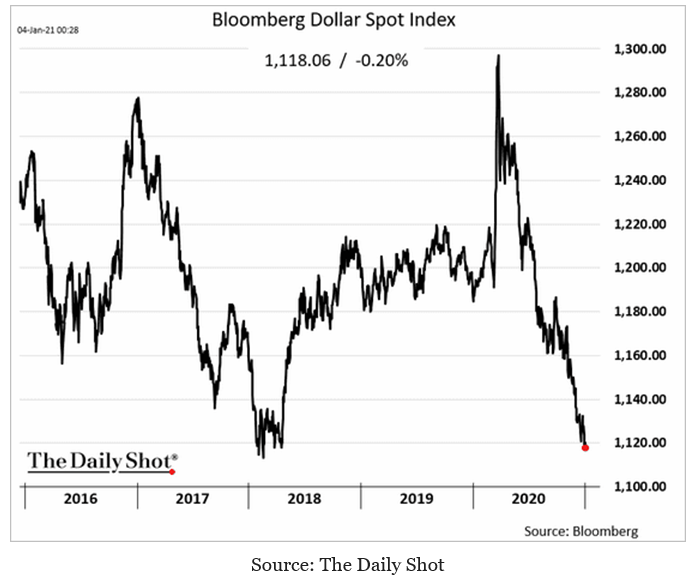One Big Thing
Now that the elections have come finally, mercifully come to a close, I thought that it would be a good idea to take a look at the likely winners and losers both in the real estate sector and the economy as a whole. I’m going to do my best to stay away from partisanship here and focus on likely outcomes. So, with no further ado:
Winners
- Blue States and Cities: Much of the flight out of cities and expensive coastal blue states that was amplified during COVID really got started with the last tax reform bill. That bill included items like the SALT deduction cap and lower mortgage deduction which disproportionately hit higher earners in high-tax states. Look for the new Administration and Congress to enact policy that will be much more supportive of state and local governments in high cost areas. Also, in a bit of irony, look for a repeal of the SALT cap, which basically amounts to a tax break for the wealthy (in certain regions). This may not be enough to reverse current trends but it will at least dampen some of the cuts to budgets and services in cities.
- Stimulus/Rescue Packages: More is coming than would have under gridlock, which is likely why the stock market is up as I write this and the bond market continues to sell off.
- Financial Markets: If we had gridlock, markets would probably have been rallying due to more anticipated Fed easing. Now with single party control, markets are supposedly rallying due to more anticipated fiscal stimulus. The lesson here is that, in a bull market with an accommodative Fed, assets tend to go up in value no matter who is in charge.
- Foreign Investment and Trade: The new Administration and Congress are likely be friendlier to foreign investment and trade than the current one. Rhetoric matters as do actions and foreign investment in US businesses and real estate is likely to rebound. Tariffs enacted over the past four years to fight trade wars will also likely be repealed.
- Tech and eCommerce: The Biden Administration is likely to be more friendly with big tech and, by extension eCommerce than the Trump Administration. The odds of forced breakups or tighter regulations are probably lower than they were before the election. This will certainly not hurt the warehouse and logistics sector which has been a primary beneficiary of eCommerce, although I’m not sure much could at this point given the secular nature of its growth.
- Infrastructure and Green Tech: Both are going to see more federal investment than they would have in a gridlocked government.
- First Time Home Buyers and Affordable Housing: Both are likely to see more federal support. If first time homebuyer incentives are put in place, it could be rocket fuel on the already-hot housing market which would ironically stretch affordability further.
- Cannabis: It’s national legalization is coming and likely accelerates with this election result.
Losers
- Capital Gains Taxes: They are very likely headed higher.
- Income Taxes: Are also likely to go back up to where they were before the Trump tax reform.
- Inheritance Taxes: These could be going up substantially. Especially if the stepped up basis rule is eliminated as has been discussed.
- 1031 Exchanges: Apparently they are on the chopping block. While I’m not sure that I believe that campaign promise will actually be upheld in Biden’s first term, just talking about eliminating them does eventually widen the Overton Window for doing just that. If this does come to pass, Opportunity Zones will be the likely beneficiary.
- Single Tenant Net Lease: If 1031s are eliminated – or for that matter it is perceived that they will be eliminated in the near future – that 6.5% cap rate on a Dollar Store off the highway in East Bumblefuck, West Virginia begins to look a lot less attractive.
Finally, a quick word about the perception of moderation and elections that will likely piss more than a few of you off:
Back in November, Republicans outperformed because (outside of the top of the ticket) they were perceived as being a moderating force more likely to uphold political norms. For example, several prominent Democrats came out and said that they were in favor of court packing, DC statehood, the Green New Deal, etc. These initiatives were not popular at the polls and voters pushed back, leading to fairly dramatic Republican outperformance in the House as a counterbalance to a Democratic administration. It also appeared that Republicans had held the Senate, which would have been the ultimate check on the Biden Administration’s agenda. All that they had to do was win one of two very winnable seats in Georgia.
Fast forward to today. A few weeks back, Republicans enjoyed a relatively close but consistent lead in Georgia Senate special election polls. Then some prominent Republican members of Congress and Senators came out in favor of not certifying electoral votes. They claimed that the election had been stolen despite losing every time the matter had been brought up in court following November’s election, often in venues with judges who had been appointed by Republicans. These conspiracy theories made the Republicans come off as more extreme and less likely to uphold political norms than their Democratic rivals. As a result, the Democratic candidates steadily rose in the polls and ultimately won both seats.
The lesson that should be taken but probably won’t is that (usually – there are notable exceptions, of course) crazy doesn’t win elections and voters tend to act accordingly if one side or the other appears ready to press the red button and blow up the whole system that has worked for almost 250 years.
What I’m Reading
Locked and Loaded: A wave of hotel properties is expected to be taken back by lenders in the coming quarters. Big hospitality players are looking to build up teams to manage these properties for their new owners. Bisnow
Through the Floor: The real yield on the US 10-year Treasury note fell to its lowest level on record this week at -1.11%. The hunt for yield is more real than ever real and not letting up anytime soon. Axios
Arms Race: In a work from home world, office amenities will help landlords and occupiers be more competitive with employees who now have more options for where and how to work. In other words, capex and opex are both going up for office owners in what will likely be a deflationary rental environment. Good times. Globe Street
Zero Point Zero: Banks in Denmark are now offering 20-year mortgages at a 0% fixed rate. Bloomberg
Adaptive Reuse: The option to work remotely is going to result in a glut of CBD office and a lot of conversions in the coming years. New York Times
Point of No Return: A survey of 3,500 Americans by The New Consumer and Coefficient Capital found that 76% of people have tried working out at home during the pandemic—and crucially, 66% prefer it. Among millennials, the number is even higher: 82% made the switch and 81% like it more. There will be outliers, but is probably time to acknowledge that gyms are one sector that is not coming back anywhere near pre-pandemic levels. Fast Company
Chart of the Day
The weakest dollar since 2018 should be enticing for foreign real estate investors.

Source: The Daily Shot
WTF
Well Endowed: The Danish equivalent of the BBC has launched a children’s TV show about a man with a giant penis that is capable of performing rescue operations, hoist a flag and etch murals. While this may seem more than a bit inappropriate for kids, the Danes are actually way behind here. The US already had its own version of the show starting around a year ago. (h/t Steve Sims). The Guardian
Jail Break: A cleaning crew left a jail holding cell open by accident, allowing a man wanted for attempted murder to escape. Oregon Live
Basis Points – A candid look at the economy, real estate, and other things sometimes related.
Visit us at RanchHarbor.com




